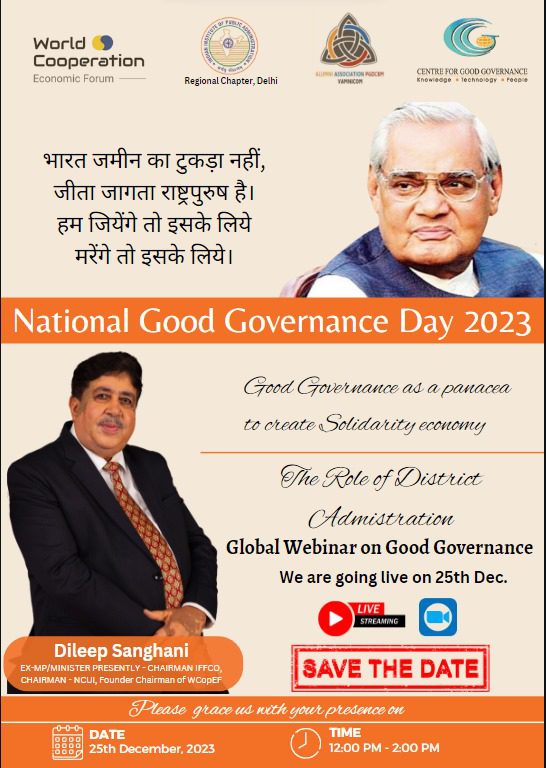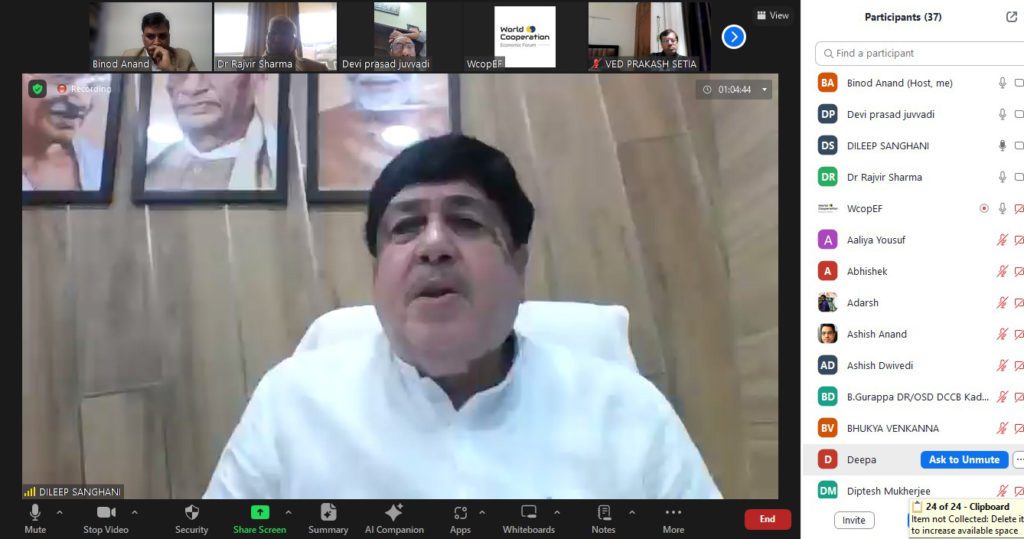Asserting that the decision of the Government of India to open a Primary Agriculture Cooperative Societies (PACS) in every Panchayat of the country i.e. forming three lakh PACS in the next five years, Dileep Sanghani, President of NCUI and Chairman of IFFCO said that this single decision has the potential of not only revolutionising the rural economy of India, but also putting the bargaining power into the hands of farmers beyond the imagination of Western economists.
He was speaking in a webinar organized by the World Cooperation Economic Forum (WCopEF) on the occasion of “Good Governance Day” marking the birth anniversary of former Prime Minister of India Late Shri Atal Bihari Vajpayee.
While outlining that cooperation in this new avatar has become the catalyst to integrate actors for a vibrant social and solidarity economy and to stabilize the economic equilibrium at grass-roots level, Sanghani said, “Moreover, the District Administration must equip itself with the changing times in the management of Public affairs and meet the requirements of the Social and Solidarity economy. It must address this newly emerged Cooperative Economic framework which may resolve all the challenges of public service delivery and create new delivery models, will deliver value for money, and implement coherent policies in a better way.” he argued.
Talking about the emergence of social economy in the webinar, Dr. Rajvir Sharma, President, IIPA Delhi region said, “When both the top-down and bottom-up models found to be deficient in meeting the needs of society, particularly the deprived sections,the idea and concept of social and solidarity economy emerged. And, recently the Government of India has put a specific focus on developing and strengthening the cooperative sector. Therefore, whether it is PACS, or FPOs, or the collaboration in the field of agriculture and health, it is for the development of rural and social economy,” he said.

“If embedded with technology like Blockchain, which may provide E-tokenized warehouse receipts, will become the game changer of the complete value chain of Food grains. It will not only reduce wastage of food grains and transportation costs but enable farmers to realize better prices for their produce and meet various agricultural needs at the PACS level itself. This process is being piloted in 22 States, UTs in 1,690 PACS through Cooperatives,” informed Mr. Anand.
Amongst the social sector leaders, academicians and agriculturalists who spoke at the webinar were Dr. Amitabh Kundu, Ex-Dean, JNU, Dr. R G. Agarwal, Chairman, Dhanuka Group, Dr. Suresh Mishra, Professor at IIPA Centre for Consumer Studies, Dr. Sudhir Suthar, Faculty Member, JNU Centre for Political Studies, Dr. Devi Prasad Juvaddi, Director Agriculture, Human Development and M&E Groups Centre for Good Governance, Dr. Rakesh Arrawatia, Professor of Institute of Rural Management and Adjunct Faculty, LBSNAA, Mussoorie, Mr. Ashish Anand, Founder, Whrrl.
The World Cooperation Economic Forum through a series of webinars, conferences and other modes of interaction will bring the process and policy to create a participatory governance system which espouses the idea of maximum governance and minimum government, claimed a press release from WCopEF.
